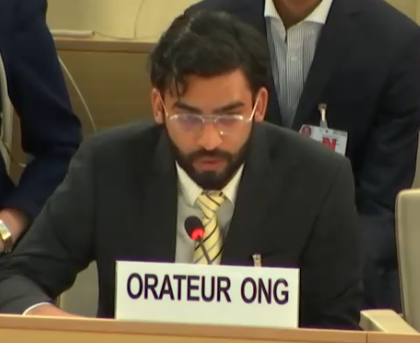
Mar 6, 2020 | Advocacy, Non-legal submissions
The ICJ, speaking in a general debate at the UN Human Rights Council in Geneva, urged all States to work together towards adoption of a treaty on business and human rights, and highlighted threats to the independence of the judiciary in Europe.
The statement, delivered in the general thematic debate at the Council, read as follows:
“The International Commission of Jurists (ICJ) welcomes the report of the 5th session of the Intergovernmental Working Group (A/HRC/43/55) in charge of the elaboration of a treaty on business and human rights and notes the consensual nature of its conclusions and recommendations. Abuses of human rights and environmental degradation caused with the involvement of business enterprises have so far been met with very limited action by businesses and States.
The ICJ considers that the revised draft treaty is a serious and advanced proposal that is suitable for negotiations and thanks the Chair-Rapporteur for its efforts and leadership in this process.
The ICJ urges States that are not yet actively involved in the negotiations to join the growing number of States that are active for a final push.
The ICJ also draws the attention of the Council to serious threats to independence of judges and lawyers in European countries.
In Poland, judges are being disciplined merely for applying EU law, under legislation curtailing their freedom of expression and independence.
In Turkey, independence of lawyers and judges continues to be seriously compromised, as demonstrated by the disciplinary proceedings against the Gezi trial judges launched after critical comments by the President of Turkey.
The ICJ urges the Council to give attention to these developments of extreme concern.”
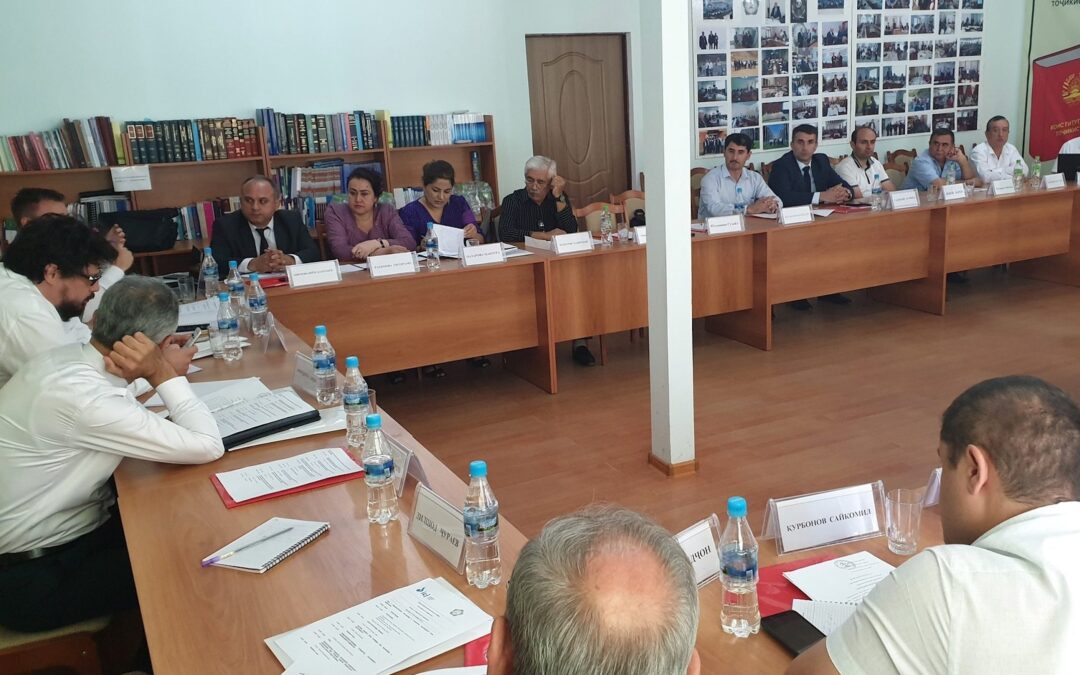
Sep 29, 2019 | News
On September 27-28, the International Commission of Jurists (ICJ), in cooperation with the Union of Lawyers of the Republic of Tajikistan, held a training on protecting the rights of lawyers and guarantees of the legal profession as well as the role of the Bar Association in protecting its members.
Around thirty lawyers from all regions of the Tajikistan took part in the training. Over two days lawyers discussed effective use of international mechanisms and international law and standards related to the protection of the rights of lawyers.
Particular attention was paid to the organization, functioning and role of the Commission for the Protection of the Professional Rights of Lawyers of the Union of Lawyers of the Republic of Tajikistan.
The event was attended by members of the Commission who had an opportunity to discuss the role and the effective work of this specialized body on protection of lawyers.
The Committee on the protection of the rights of lawyers of the Ukrainian National Bar Association delegated its members to the event to share their best practices and recommendations to overcome the challenges which arise in the work of these bodies.
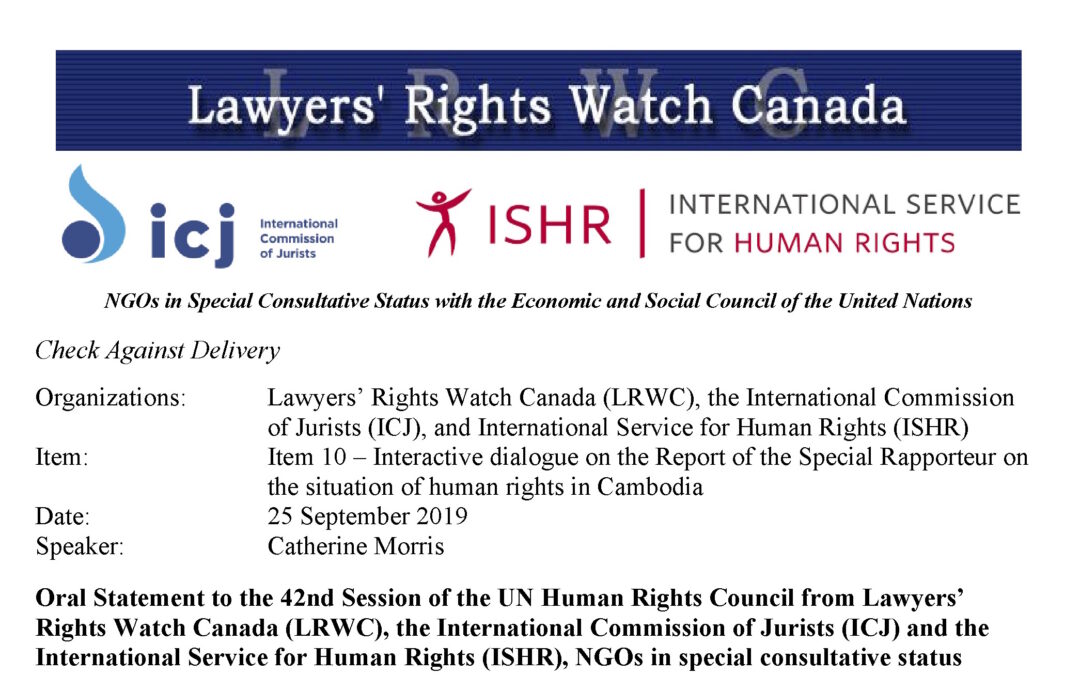
Sep 25, 2019 | Advocacy, Non-legal submissions
The ICJ today joined other NGOs in drawing the UN Human Rights Council’s attention to the role of the Government of Cambodia in widespread human rights violations and abuses in the country, and called for renewal of the mandate of the UN Special Rapporteur.
The joint NGO statement was delivered by Lawyers’ Rights Watch Canada in a dialogue on the situation in Libya. The statement read as follows:
“Lawyers’ Rights Watch Canada (LRWC), the International Commission of Jurists (ICJ), and the International Service for Human Rights (ISHR) thank the Special Rapporteur for her reports. Implementation of the Sustainable Development Goals, ensuring that no one is “left behind,” necessitates equal access to remedies for rights violations within a trustworthy and independent legal system.
Cambodia has not fulfilled its treaty obligations to establish judicial independence and integrity. Civil society’s rights advocacy is continually resisted. Lawyers, defenders, journalists, politicians, or activists reporting on corruption, election irregularities, labour rights violations, illegitimate land acquisition, environmental degradation, or other rights abuses, often by businesses, are routinely subjected to official vilification; intimidation; interference with rights to expression, association, and assembly; criminalization; arbitrary detention; and even unlawful killings with impunity.
Since 2017, political opposition has been systematically suppressed, including through misuse of the judiciary. Despite the Special Rapporteur’s repeated calls for release of opposition leader Kem Sokha, he remains under court-imposed restrictions tantamount to house arrest. The Special Rapporteur has been denied visits with him contrary to Special Procedures terms of reference for country visits. In May, 25 former opposition members were summoned to court for questioning over two weeks. In September, the government threatened to arrest anyone supporting opposition politician Sam Rainsy’s return to Cambodia.
Cambodia’s responses to Special Procedures’ recommendations for the past twenty-five years have been characterized by disregard, delay, resistance, or hostility. Continued support for the Special Rapporteur’s mandate is critical to ensure that Cambodia fulfils its international human rights obligations. We request that the Council extend the mandate.”
The full written statement, including references, can be downloaded in PDF format here: UN-HRC42-Cambodia-2019
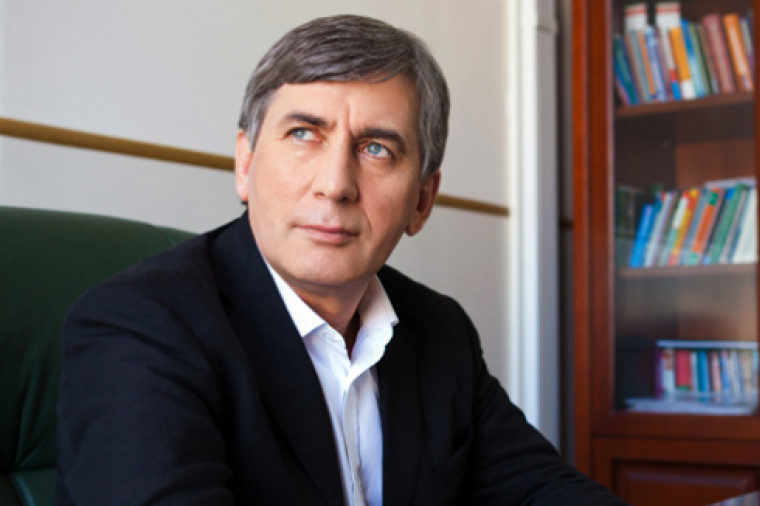
Sep 24, 2019 | News
The ICJ today called for an end to criminal proceedings against Dagir Hasavov, a prominent Russian lawyer facing prosecution on allegations of obstruction of justice.
On 17 September, less than a week after lawyer Dmitriy Sotnikov was physically attacked in court, Dagir Hasavov was detained by police in the Lefortovo court building in Moscow. He was charged with “obstruction of justice” and “bribery or coercion to testify or evasion of giving evidence” (articles 294.1 and 309.4 of the Russian Criminal Code). On 18 September, Moscow Basmanny court authorised the detention of Hasavov until 16 November.
“There are strong indications that these charges are spurious and that the arrest of Dagir Hasavov is an attempt to obstruct him in carrying out his professional duties, and to prevent his clients from having a fair trial. The proceedings should be discontinued and he should be immediately released.” said Róisín Pillay, ICJ Europe and Central Asia Programme Director. “Such arrests also send a clear message of intimidation to other lawyers. Without urgent measures to end harassment of lawyers, the ability of the legal profession to protect human rights will be increasingly jeopardized”.
Dagir Khasavov represented the former Dagestan Prime Minister Abdusamad Hamidov, who was detained together with his deputy Rayudin Yusufov by the FSB in February 2018 as part of a special anti-corruption operation and was charged with multiple criminal offences, including embezzlement.
Prosecutors allege that Dagir Hasavov threatened Albert Havchaev, a witness in the trial, and attempted to coerce him to testify in court for the benefit of the defence. Hasavov’s home was also searched.
Eduard Isetskiy, another lawyer of the former Dagestan Prime Minister, has stated that after the arrest of Hasavov he and other colleagues were told by investigators that they would face similar prosecution. He added that towards the end of a trial, about a week before the Hasavov’s arrest, the State Prosecutor on the case was replaced and the courtroom became increasingly surrounded with armed and masked security forces. The new prosecutor called lawyers “extremists” and filed a motion to have all their social networks accounts blocked.
Any criminal proceedings against the lawyer amounting to harassment or reprisals for his professional activities would constitute not only an assault on the legal profession in the Russian Federation, but also a violation of the right to a fair trial, protected under international human rights law.
Moreover, international standards on the rights of lawyers, including the UN Basic Principles on the Role of Lawyers, provide that governments must ensure that lawyers “are able to perform all of their professional functions without intimidation, hindrance, harassment or improper interference” and “shall not suffer, or be threatened with, prosecution or administrative, economic or other sanctions for any action taken in accordance with recognized professional duties, standards and ethics.”
The ICJ stresses that these attacks, arrests and criminal proceedings that have been taking place in Russia lately, create a chilling effect on the proper exercise of professional duties by lawyers, endangering the right to a fair trial and undermining the justice system.
Additional information:
Dagir Hasavov is a prominent lawyer in Russia who has taken many cases dealing with allegations of religious extremism or terrorism. He has defended among others the Moscow imam Mahmud Velitov, convicted for justification of terrorism; the former representative of the President in Sakhalin oblast charged with extremism; several persons accused of participation in Hizb ut-Tahrir, the organization banned in Russia. He also represented pro bono the parents of a murdered 5-year-old Tajik girl Huvaido Tillozoda.
It has been reported that around 100 lawyers are joining together to defend Hasavov as the Russian legal community has realized the need for corporate solidarity in the face of the increasing threats to the security of lawyers and independence of the profession.
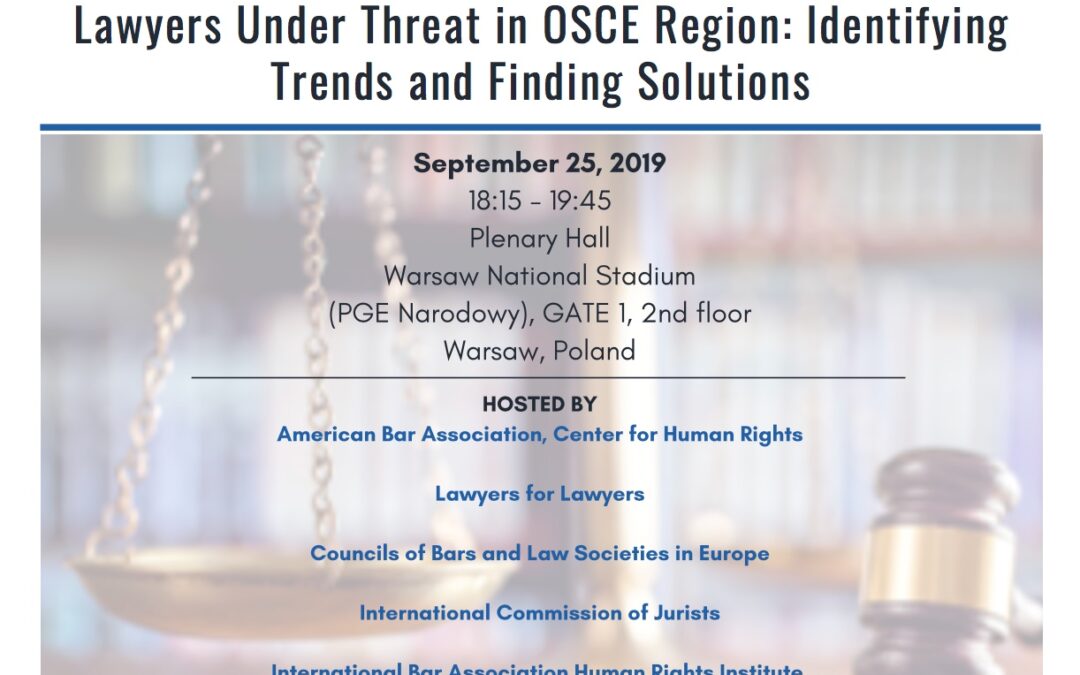
Sep 24, 2019 | Events, News
The side event aims to identify current threats against lawyers’ professional rights and guarantees in the OSCE region.
The speakers will identify and analyze the current trends through a discussion of recently gathered data and specific cases of violation of lawyers’ rights from Kyrgyzstan, Kazakhstan, Tajikistan, Moldova, Ukraine, Azerbaijan, Russia and Belarus. They will also make recommendations regarding the way forward to increase protection for lawyers and the independent legal profession in these countries and the OSCE region as a whole.
A flyer for the event is available here.
The agenda for the event available here.









